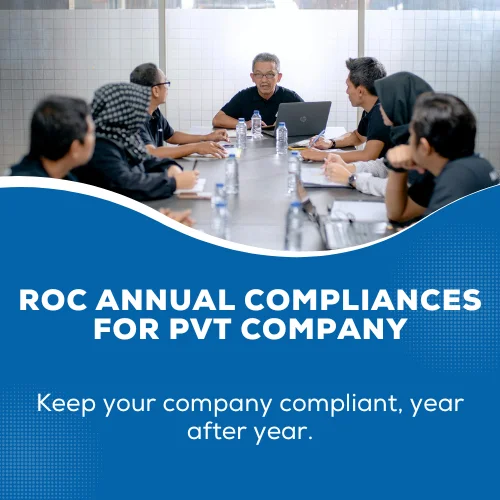ROC Annual Compliances for Private Limited Company
Private Limited Company Compliance – Done Right!
Every Private Limited Company registered in India must file its annual returns and financial statements with the Registrar of Companies (ROC) every year.

This ensures that your company stays legally active, compliant, and trusted by clients, banks, and investors.
Consultation with CA/CS/Advocate Free for Lifetime
- Get Instant Quote
What’s Included ✅
- Preparation & Filing of Form AOC-4 (Financial Statements)
- Preparation & Filing of Form MGT-7 / MGT-7A (Annual Return)
- Board Report & Director’s Report Drafting
- Preparation of AGM Minutes & Resolutions
- ROC Acknowledgment & Proof of Filing
- Expert Consultation & Compliance Review

Exclusive Free Benefits 🎁
- Free compliance calendar (PDF) – know all your due dates.
- Free reminder alerts – never miss a filing again.
- Free consultation on company compliance health – check if you’re fully updated.
- Free CS expert call – resolve any compliance doubts.
- Free basic review of last year’s filings – spot missed forms easily.
10,000+ Companies & Individuals Put Their Trust In Us
























✅ Clear Guidance: They explained every step in simple, easy-to-understand terms, so I always knew what was happening.
✅ Fast & Efficient: My filing was completed quickly without any unnecessary delays.
✅ Accuracy & Trust: I felt confident knowing my details were handled with care and precision.
✅ Great Support: Any small questions I had were answered patiently and thoroughly.
ROC Annual Compliances for Private Limited Company
Are you running a private limited company? But do you know along with private limited registration, some mandatory legalities are also there.
You must adhere to some rules and regulations that have been set under Companies Act 2013 by MCA (Ministry of Corporate Affairs). If you stay updated with roc annual compliances, you can increase the transparency of your company.
Click To Professionals will help provide you the complete ROC annual compliance services. You should make sure about compliance with ROC i.e. Registrar of Companies in order to maintain the legal standing of your company as well as to build trust and credibility in the eyes of stakeholders.

Private Limited Company
What Are Annual ROC Compliances?
Basically, ROC Compliances means the submission of various forms, returns and documents that have been mandated by the MCA. These filings will help the government to track the financial status and operations of a company making sure about transparency and accountability. If you fail to stay compliant it will lead to hefty penalties, disqualification of directors or even result in the striking off of the company.
Importance of ROC Compliances for Private Limited Company
These are the importance of Private Limited Company annual return filing. So keeping these points in mind, you should stay compliant with ROC annual compliances services of Click To Professionals.
ROC Annual Filing is a legal requirement of a Private Limited Company. All companies that have been incorporated under Companies Act 2013 must have to submit annual returns and other filings with ROC i.e. Registrar of Companies. If you comply with these requirements, it will make sure about adherence to laws & regulations.
If you file annual returns, the government, regulators, and stakeholders will get a clear picture of the financial position, shareholding, and management structure of your company.
If you stay compliant, it will result in hefty fines, legal actions, and even in the disqualification of directors that can harm the reputation and operations of your company.
Staying compliant will build the trust of investors, creditors, and other stakeholders in the company and it becomes easier for the companies to secure funding and partnerships.
If you don’t stay compliant, it will lead to the striking off of the name of your company from the registrar, which leads to the loss of its legal status.
ROC Compliances for Private Limited Company
As per the rules and regulations that have been set by ROC i.e. Registrar of Companies, adherence to compliances is crucial for the companies operating in India. ROC Compliances for Private Limited Company are broadly divided into three categories.
These categories are as follow:

Annual Compliances
These are the regular, yearly filings and disclosures that a company must file that include submitting annual returns and financial statements.
Event-Based Compliances
There are some specific compliances that must have to be addressed as and when certain events occur within the company including change in the management, share capital, or registered office of your company. These are the event-based compliances.
Other Compliances
These compliances may not fall under the category of annual and event-based compliances but are essential in order to maintain the legal status of the company including director KYC updation and maintenance of statutory registers.
Private Limited Company Annual Compliances
Here is the ROC Annual Compliances Checklist-
It is mandatory for the companies that have been registered after November 2019 to secure a certificate of commencement of business before initiating any business activities. Companies must have to acquire this certificate by filing Form INC-20A.
It is compulsory for all the registered Private Limited Companies to appoint a statutory auditor after incorporation of the company for a tenure of 5 years or minimum as decided by the management. The role of the auditor is to look after the financial sheets of the company. Without the appointment of an auditor, companies are not eligible to commence the business operations. Form ADT-1 is used to confirm the appointment of the auditor.
Private Limited Companies must conduct the first AGM within nine months from the end of the first Financial Year. Whereas, for subsequent years the AGM must be held every year within six months from the closure of the financial year. Its main purpose is the approval of financial statements, electing board members, appointment/ reappointment of auditor, discussion about the management, etc.
Some Important Points to Remember about AGM-
- AGM should not be held on public holidays.
- AGM must be held at the registered office of the company
- A notice consisting of the date, time, and place of the meeting must be issued at least 21 days before the meeting.
- The gap between two AGMs should not be more than 15 months.
Board meeting will be held between the board of directors of a private limited company in order to discuss the operational structure of the company and its future growth. In a financial year, a private limited company must conduct at least four board meetings (2 board meetings in case of small private companies) and the gap between two board meetings should not be more than 120 days. It is mandatory for 1/3rd or a minimum of 2 directors to present in a board meeting. The notice for the board meeting should be given to the directors at least 7 days prior to the meeting.
It is mandatory for all the registered private limited companies to file their ITR i.e. Income Tax Return doesn’t matter, whether it is profit or loss. You must have to file your ITR within the given period of time in order to avoid the penalties.
All the registered private limited companies must have to file their annual returns via Form MGT-7. Companies must have to file MGT-7 in order to capture the shareholding structure, management details, and other significant information of the company. In this form you must file the list of shareholders, and directors, changes in directorship or shareholding, and details of registered office & principal business activities.
It is mandatory for all the registered private limited companies to submit their financial statements that include providing all the details of the balance sheet of the company and board meetings. We have to file this by using Form AOC-4 that contains the details including balance sheet, profit & loss account, cash flow statement, auditor’s report, director’s report, and board’s report.
Each & every director of private limited companies must update their KYC every year. Directors need to file the form DIR-3 KYC in order to inform the ministry that they are still active within the company. Directors whose DIN i.e. Director Identification number had been allotted by March 31st of that particular year having ‘Approved’ status must have to update their KYC.
Private Limited Companies must report the details of deposits, loans, and other non-deposit receipts in form DPT-3. It is applicable for the companies that accept loans & deposits. You have to fill the details of exempted deposits, and outstanding loan balances in this form.
Directors of the Company must have to disclose their interest in a company or other entity to that particular company and its shareholders. In case, if any director is a part of any other company they need to give a notice regarding the interest to the company through Form MBP-1.
All the registered private limited companies must have to maintain and update their various statutory registers and records, that include minutes of board meetings and AGMs, books of accounts, financial statements, regularly and file them with ROC.
ROC Annual Compliances Forms for Private Limited Company
In order to stay compliant private limited companies have to be aware about the different forms associated with annual compliances.
These forms are as below:
ROC Annual Compliances & Associated Forms
Form ADT-1
Form INC-20A
Form AOC-4
Form DIR-3 KYC
Form MBP-1
Form MGT-7/ 7A
Form DPT-3
Form ITR-6
Form DIR-12
Form MGT-14
ROC Annual Compliances
Associated Forms
- Appointment/ Reappointment of Auditor
- Declaration for Commencement of Business
- Filing of Financial Statements
- Director KYC Submission
- Director Disclosure
- Annual Returns Filing
- Return of Deposits
- Income Tax Return
- Appointment/ Resignation of Directors
- Filing of Board Resolution
- Form ADT-1
- Form INC-20A
- Form AOC-4
- Form DIR-3 KYC
- Form MBP-1
- Form MGT-7/ 7A
- Form DPT-3
- Form ITR-6
- Form DIR-12
- Form MGT-14
ROC Annual Compliances Due Date for Private Limited Company
Each and every compliance has their own due dates by which the particular forms should be filed.
Here are the dates:
- Commencement of Business Certificate - Within 180 Days of Incorporation
- Appointment of Auditor (ADT-1) - Within 30 Days of Incorporation
- Board Meetings - As per the schedule (first meeting within 30 days of incorporation)
- Annual General Meeting - Within 6 months of end of Financial Year
- Declaration of Commencement of Business (INC-20A) - Within 180 days of incorporation
- Income Tax Return Filing (ITR-6) - By July 31st (in non-audit case) By October 31st (in case of audit)
- Annual Return Filing (Form MGT-7/ 7A) - Within 60 days of AGM
- Director KYC (DIR-3 KYC) - By September 30th every year
- Return of Deposits (Form DPT-3) - By June 30 every year
- Reappointment of Auditor (Form ADT-1) - Within 15 days of AGM
- Filing Financial Statements (Form AOC-4) - Within 30 days of AGM
- Filing Board Resolutions (Form MGT-14) - Within 30 days of passing the resolution
- Disclosure of Director's Interest (Form MBP-1) - In first board meeting
- Maintaining Statutory Registers & Book of Accounts - Throughout the Financial Year
- Circulation of Financial Statements and Other Relevant Documents - At least 21 days before the AGM
ROC Annual Compliances Penalties for Private Limited Companies
If you fail to fulfil any of the ROC compliances, it will lead to hefty penalties. Now, we are going to discuss penalties levied on each compliance.
Here are the penalties:
Declaration of the Commencement of Business
Companies must have to file the form INC-20A for the declaration of the commencement of the business within 180 days of incorporation. If you miss this deadline by any chance, then it will attract a hefty penalty of up to Rs. 5,200/-
Auditor Appointment
All the registered Private Limited Companies must have to appoint an auditor within 30 days of incorporation and need to report about it to the respective ministry by filing form ADT-1 within the given period of time. If you fail to do so, it will lead to a penalty of Rs. 300/- per month.
Income Tax Return Filing
All the private limited companies must have to file their ITR on time by using form ITR-6. If you miss its due date, a penalty of up to Rs. 5,000/- will be levied on you.
Filing Financial Statements of Company
It is mandatory for the companies to file their financial statements on the portal of MCA by using form AOC-4. You must have to file this form within 30 days of AGM. Failure to do so will lead to a penalty of Rs. 100 per day that can be up to Rs. 10 lakhs.
Director KYC
Each director of a company must update their KYC by September 30 of each and every year. If by any chance you miss this due date, the DIN of that director will get deactivated and for its activation you have to pay a penalty of Rs. 5,000/-
Annual Return Filing
All the registered Private Limited Companies must have to file their annual returns by using form MGT-7 within 60 days of AGM. If you missed this deadline, then a penalty of Rs. 100/- per day will be levied on you.
Return of Deposits
Companies have to file the return of deposits through the form DPT-3 by June 30 every year. If you miss this deadline, then a penalty of up to Rs. 5,000/- will be imposed on you.
Disclosure of Director’s Interest
Directors of the companies must have to disclose their interests via Form MBP-1 in the first board meeting. If by any chance, directors miss the due date, then they are punishable with the imprisonment of up to one year, or a fine of up to Rs. 1 lakh or both.
Declaration of the Commencement of Business
Auditor Appointment
Income Tax Return Filing
Filing Financial Statements of Company
Director KYC
Annual Return Filing
Return of Deposits
Disclosure of Director’s Interest
These are the penalties for missing the due date of roc compliances of a company. To understand them properly, you can seek the guidance of professional ROC Annual Compliance Services.
Process of ROC Annual Filing of Private Limited Company
First of all, you should collect the complete financial data of the company including balance sheets, profit & loss statements as well as cash flow statements. You should also need to update details of directors, shareholders, & registered office. Along with this, you need to obtain audit reports from the statutory auditor.
You should create and maintain a compliance calendar in order to remember the due dates and avoid penalties.
After that you need to fill all the necessary forms including AOC-4, MGT-7, ADT-1, INC-20A, etc. on the MCA i.e. Ministry of Corporate Affairs, Portal. You also need to update the director KYC by using Form DIR-3 KYC.
All the forms must be authenticated and digitally signed by a director and certified by a practicing professional, either CA, or CS, or CMA.
After filing all the forms, you need to make sure to download and save the acknowledgement receipt as a proof to keep records.
These are the main steps included in the process of filing ROC Annual Compliances of Private Limited Companies.
Event-Based Compliances for Private Limited Company
Other than annual filings, there are some other compliances that need to be complied when any event occurred in the company.
Here we will discuss about such event-based compliances which are-
- In case of any change in authorized or paid-up capital of the company
- At the time of allotment or transfer of new shares
- When a company gives loans to directors or other companies
- In case of appointment of managing or whole-time director
- When a company needs to open or close a bank account or if there is any change in the signatory authority of a bank account
- When there is an appointment or change of the statutory auditors of the company
Final Words
It is crucial for the smooth functioning of Private Limited Companies to adhere to the annual ROC Compliances. ROC Compliances will make sure that your company will remain legally compliant. It will also help in avoiding penalties and positive reputation among stakeholders. Regular filings also help in maintaining transparency and building trust among investors & creditors.
At Click To Professionals, we have expertise in providing hassle-free compliance solutions. Our dedicated team of professionals will guide you through each and every step of the process. So, contact us now in order to make sure that your company remains compliant and successful.

ROC Filing for Pvt Ltd Company
Private limited companies can preserve compliance, stay out of trouble, and establish credibility by using ROC Annual Filing for Pvt. Ltd Company. Knowing your annual compliance obligations is essential if you’re managing a private limited company (LLP) in India. Many businesses fail to submit ROC filings for private companies, which can result in the Ministry of Corporate Affairs imposing heavy fines or even striking them off.
Everything you need to know about ROC Annual Filing is covered in this blog, including the ROC return each year, deadlines, documents, ROC filing fees, and the reasons that hiring a professional is advised for ROC filing for PVT LTD companies.
What Makes ROC Annual Filing for Crucial?
Every financial year, all companies that were incorporated under the Companies Act must submit specific forms and documents to the Registrar of Companies (ROC). The ROC Annual Filing is the name of this procedure.
According to Indian company law, you must file a company ROC regardless of whether you are a private limited company or an LLP. For private companies, timely ROC filings benefit you:
Adhere to legal requirements.
Steer clear of late fees and penalties.
Gain the confidence of the stakeholders.
Continue to operate your business.
I miss having you around. Deadlines for filing ROC returns can result in fines of ₹100 per form per day and possibly have your business shut down.
Who Must Submit ROC Returns?
All businesses that are registered under the 2013 Companies Act or previous Acts, such as:
Private limited businesses
Limited companies that are publicly traded
OPCs, or one-person companies
Partnerships with limited liability (LLPs)
Must complete the company’s ROC filing every year. You must still complete your ROC Annual Filing even if your business has no transactions throughout the year.
Important ROC Documents for Private Limited Businesses
Let’s examine the two most crucial documents that comprise the ROC annual return:
1. Financial Statement Filing Form AOC-4
The balance sheet, profit and loss statement, auditor’s report, and other financial statements for your business are included in this form.
30 days following your Annual General Meeting (AGM) is the deadline.
2. The Annual Return Form MGT-7
This is the yearly return for your business that includes information about directors, shareholders, shareholding changes, etc.
60 days following your AGM is the deadline.
The primary LLP ROC filing forms for LLPs are:
Statement of Account & Solvency (LLP Form 8)
Form 11 (Annual Return) for LLP
Step-by-Step Guide to ROC Filing for Pvt Ltd Companies
Here is a quick guide to correctly filling out your ROC filing for PVT LTD:
First, call an AGM.
An AGM must be held by your organisation within six months of the fiscal year’s conclusion.
Create financial statements in step two.
Have the board of directors review and approve your financial statements.
Step 3: Submit AOC-4 Form
Within 30 days following the AGM, submit financial statements to the ROC.
File Form MGT-7 in Step Four.
Within sixty days following the AGM, submit your annual return.
You can make sure your company’s ROC return filing is accurate and compliant by following these steps.
What Takes Place If ROC Filing Is Missed?
Serious repercussions may result from incomplete ROC filings for private limited companies:
A fine of ₹100 per day is imposed on each form.
Directors are subject to additional fines.
Your company may be struck from MCA records.
Credibility of the company is lost.
It is obvious that you cannot overlook ROC Annual Filing.
Required Documents for the Annual ROC Filing
Prepare the following paperwork before filing ROCs for private companies:
Financial statements that have been audited.
A chartered accountant’s audit report.
Resolutions of the board and shareholders.
Information about the shareholders, directors, and shareholding structure.
An annual return and a statement of account and solvency are also required for ROC filing for LLP Company.
ROC Filing Fees: How Much Are They?
The authorised capital of your business and the kind of form being filed determine the ROC filing fees. In general, smaller businesses pay less in fees.
LLPs charge set fees that are determined by contributions.
If deadlines are missed, there are additional late fees of ₹100 per form per day.
By submitting your forms on time, you can avoid paying expensive ROC filing fees.
The Benefits of Hiring a Professional
Hiring a qualified chartered accountant or company secretary is strongly advised, even though you can attempt to manage company ROC filing on your own. They assist in making sure your ROC filings for private companies are timely, accurate, and in accordance with all MCA regulations.
You can speak with professionals at Click To Professionals who specialize in LLP ROC filing and ROC filing for private limited companies.
Ways to Make ROC Filing Easier
The following useful advice will help to reduce the stress associated with ROC Annual Filing:
Keep track of your finances all year long.
A professional should be hired well in advance of the filing deadlines.
When filing your company’s ROC return, use reputable online platforms.
Avoid rushing at the last minute to cut down on mistakes and fines.
All ROC deadlines should have reminders set.
ROC Annual Filing: Essential for All Businesses
You cannot afford to overlook your annual return of ROC, regardless of whether you are the owner of a small startup, an established private limited company, or an LLP. The financial and reputational costs of non-compliance are high.
In addition to being required by law, timely submission of your private limited company’s ROC filing each year reassures your stakeholders of the reliability and sound management of your business.
Frequently Asked Questions
ROC Annual Filing: What is it?
It involves submitting your company’s yearly statutory and financial returns to the Registrar of Companies.
Who is responsible for filing the company’s ROC?
Even if there were no transactions during the year, all Indian registered companies and limited liability partnerships are required to submit an annual report.
What occurs if I fail to submit my ROC returns?
You could be fined, directors could be removed, and your business could be shut down.
Is it possible to submit ROC returns online?
Indeed. The MCA portal is used to file the majority of forms for filing LLP ROCs and company ROC returns online.
Concluding
ROC Annual Filing is a legal requirement that maintains your company’s credibility and compliance, not just a formality. Although the process may appear difficult, you can easily finish filing your company’s ROC return and avoid significant penalties if you get expert assistance and act quickly.
Make sure you complete all ROC filings for private companies on time and correctly, whether they are for LLPs, PVT LTDs, or other types of businesses. Good compliance is, after all, good business.










